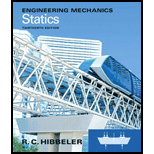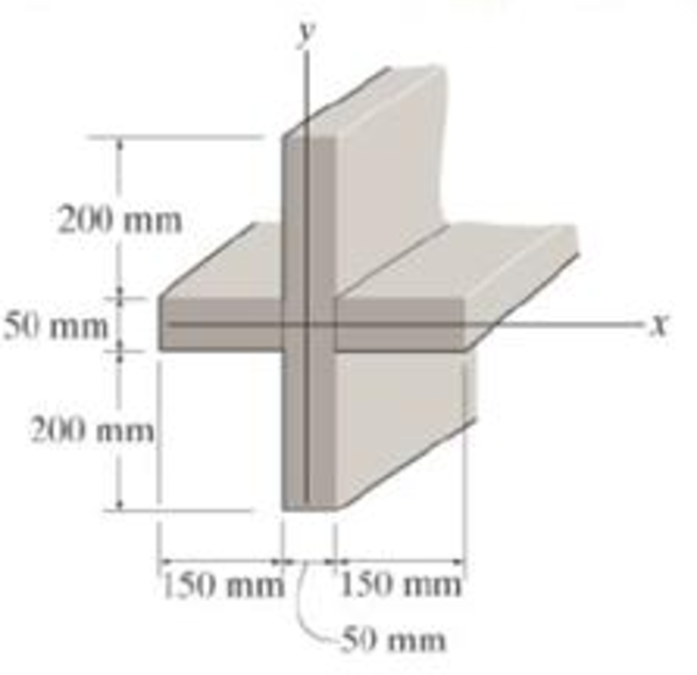
Engineering Mechanics: Statics
13th Edition
ISBN: 9780132915540
Author: Russell C. Hibbeler
Publisher: Prentice Hall
expand_more
expand_more
format_list_bulleted
Concept explainers
Textbook Question
Chapter 10.4, Problem 5FP
Determine the moment of inertia of the beam’s cross-sectional area about the centroidal x and y axes.

Expert Solution & Answer
Trending nowThis is a popular solution!

Students have asked these similar questions
CORRECT AND DETAILED SOLUTION WITH FBD ONLY. I WILL UPVOTE THANK YOU. CORRECT ANSWER IS ALREADY PROVIDED. I REALLY NEED FBD.
The cantilevered spandrel beam shown whose depth tapers from d1 to d2, has a constant width of 120mm. It carries a triangularly distributed end reaction.Given: d1 = 600 mm, d2 = 120 mm, L = 1 m, w = 100 kN/m1. Calculate the maximum flexural stress at the support, in kN-m.2. Determine the distance (m), from the free end, of the section with maximum flexural stress.3. Determine the maximum flexural stress in the beam, in MPa.ANSWERS: (1) 4.630 MPa; (2) 905.8688 m; (3) 4.65 MPa
CORRECT AND DETAILED SOLUTION WITH FBD ONLY. I WILL UPVOTE THANK YOU. CORRECT ANSWER IS ALREADY PROVIDED. I REALLY NEED FBD
A concrete wall retains water as shown. Assume that the wall is fixed at the base. Given: H = 3 m, t = 0.5m, Concrete unit weight = 23 kN/m3Unit weight of water = 9.81 kN/m3(Hint: The pressure of water is linearly increasing from the surface to the bottom with intensity 9.81d.)1. Find the maximum compressive stress (MPa) at the base of the wall if the water reaches the top.2. If the maximum compressive stress at the base of the wall is not to exceed 0.40 MPa, what is the maximum allowable depth(m) of the water?3. If the tensile stress at the base is zero, what is the maximum allowable depth (m) of the water?ANSWERS: (1) 1.13 MPa, (2) 2.0 m, (3) 1.20 m
CORRECT AND DETAILED SOLUTION WITH FBD ONLY. I WILL UPVOTE THANK YOU. CORRECT ANSWER IS ALREADY PROVIDED. I NEED FBD
A short plate is attached to the center of the shaft as shown. The bottom of the shaft is fixed to the ground.Given: a = 75 mm, h = 125 mm, D = 38 mmP1 = 24 kN, P2 = 28 kN1. Calculate the maximum torsional stress in the shaft, in MPa.2. Calculate the maximum flexural stress in the shaft, in MPa.3. Calculate the maximum horizontal shear stress in the shaft, in MPa.ANSWERS: (1) 167.07 MPa; (2) 679.77 MPa; (3) 28.22 MPa
Chapter 10 Solutions
Engineering Mechanics: Statics
Ch. 10.3 - Determine the moment of inertia of the shaded area...Ch. 10.3 - Determine the moment of inertia of the shaded area...Ch. 10.3 - Determine the moment of inertia of the shaded area...Ch. 10.3 - Determine the moment of inertia of the shaded area...Ch. 10.3 - Prob. 1PCh. 10.3 - Prob. 2PCh. 10.3 - Prob. 3PCh. 10.3 - Prob. 4PCh. 10.3 - Prob. 5PCh. 10.3 - Prob. 6P
Ch. 10.3 - Prob. 7PCh. 10.3 - Prob. 8PCh. 10.3 - Determine the moment of inertia of the area about...Ch. 10.3 - Solve the problem in two ways, using rectangular...Ch. 10.3 - Prob. 11PCh. 10.3 - Prob. 12PCh. 10.3 - Prob. 13PCh. 10.3 - Prob. 14PCh. 10.3 - Prob. 15PCh. 10.3 - Prob. 16PCh. 10.3 - Prob. 17PCh. 10.3 - Prob. 18PCh. 10.3 - Prob. 19PCh. 10.3 - Prob. 20PCh. 10.3 - Prob. 21PCh. 10.3 - Prob. 22PCh. 10.3 - Prob. 23PCh. 10.3 - Prob. 24PCh. 10.4 - Determine the moment of inertia of the beams...Ch. 10.4 - Determine the moment of inertia of the beams...Ch. 10.4 - Determine me moment of inertia of the...Ch. 10.4 - Determine the moment of inertia of the...Ch. 10.4 - Determine the moment of inertia of the composite...Ch. 10.4 - Determine the moment of inertia of the composite...Ch. 10.4 - Prob. 27PCh. 10.4 - Prob. 28PCh. 10.4 - Prob. 29PCh. 10.4 - Prob. 30PCh. 10.4 - Prob. 31PCh. 10.4 - Prob. 32PCh. 10.4 - Prob. 33PCh. 10.4 - Determine the moment of inertia of the beams...Ch. 10.4 - Determine, g, which locates the centroidal axis z...Ch. 10.4 - Prob. 36PCh. 10.4 - Prob. 37PCh. 10.4 - Prob. 38PCh. 10.4 - Prob. 39PCh. 10.4 - Prob. 41PCh. 10.4 - Determine the moment of inertia of the beams...Ch. 10.4 - Prob. 43PCh. 10.4 - Prob. 44PCh. 10.4 - Determine the distance x to the centroid C of the...Ch. 10.4 - Determine the moment of inertia of the area about...Ch. 10.4 - Determine the moment of inertia of the area about...Ch. 10.4 - Prob. 50PCh. 10.4 - Prob. 51PCh. 10.4 - Determine the moment of inertia of the...Ch. 10.4 - Determine the moment of inertia of the...Ch. 10.7 - Determine the product of inertia of the thin strip...Ch. 10.7 - Prob. 55PCh. 10.7 - Determine the product of inertia of the shaded...Ch. 10.7 - Prob. 57PCh. 10.7 - Determine the product of inertia of the shaded...Ch. 10.7 - Prob. 59PCh. 10.7 - Prob. 60PCh. 10.7 - Prob. 62PCh. 10.7 - Determine the product of inertia for the beams...Ch. 10.7 - Prob. 64PCh. 10.7 - Prob. 65PCh. 10.7 - Determine the product of inertia of the cross...Ch. 10.7 - Prob. 67PCh. 10.7 - For the calculation, assume all comers to be...Ch. 10.7 - Prob. 69PCh. 10.7 - Prob. 70PCh. 10.7 - Prob. 71PCh. 10.7 - Prob. 72PCh. 10.7 - Prob. 73PCh. 10.7 - Prob. 74PCh. 10.7 - Prob. 75PCh. 10.7 - Prob. 76PCh. 10.7 - Prob. 77PCh. 10.7 - Prob. 78PCh. 10.7 - Prob. 79PCh. 10.7 - Prob. 80PCh. 10.7 - Prob. 81PCh. 10.7 - Prob. 82PCh. 10.7 - using Mohrs circle.Ch. 10.8 - Determine the moment of inertia of the thin ring...Ch. 10.8 - The material has a constant density .Ch. 10.8 - Prob. 86PCh. 10.8 - Determine the radius of gyration kx of the...Ch. 10.8 - The material has a constant density .Ch. 10.8 - Hint: For integration, use thin plate elements...Ch. 10.8 - Prob. 90PCh. 10.8 - Prob. 91PCh. 10.8 - Determine the moment of inertia Iy. The specific...Ch. 10.8 - Prob. 93PCh. 10.8 - The total mass of the solid is 1500 kg.Ch. 10.8 - Prob. 95PCh. 10.8 - Prob. 96PCh. 10.8 - Determine the location y of the center of mass G...Ch. 10.8 - Prob. 98PCh. 10.8 - 15 lb. and 20 lb, respectively, determine the mass...Ch. 10.8 - The density of the material is 7.85 Mg/m3.Ch. 10.8 - The material has a density of 200kg/m3. Prob....Ch. 10.8 - The pendulum consists of a plate having a weight...Ch. 10.8 - Prob. 103PCh. 10.8 - The material has a density of 200kg/m3.Ch. 10.8 - Prob. 105PCh. 10.8 - Determine its mass moment of inertia about the y...Ch. 10.8 - Prob. 107PCh. 10.8 - Prob. 108PCh. 10.8 - Prob. 109PCh. 10.8 - Determine the moment of inertia for the shaded...Ch. 10.8 - Prob. 111RPCh. 10.8 - Determine the product of inertia of the shaded...Ch. 10.8 - Determine the area moment of inertia of the...Ch. 10.8 - Determine the area moment of inertia of the shaded...Ch. 10.8 - Determine the moment of inertia for the shaded...Ch. 10.8 - Prob. 117RPCh. 10.8 - Prob. 119RP
Additional Engineering Textbook Solutions
Find more solutions based on key concepts
What is the difference between a formal programming language and a pseudocode?
Computer Science: An Overview (13th Edition) (What's New in Computer Science)
In the following exercises, write a program to carry out the task. The program should use variables for each of...
Introduction To Programming Using Visual Basic (11th Edition)
Find the error in each of the following code segments: 1. catch (FileNotFoundException e) { System.out.println(...
Starting Out with Java: From Control Structures through Data Structures (4th Edition) (What's New in Computer Science)
ICA 8-45
A 10-gram [g] rubber ball is released from a height of 6 meters [m] above a flat surface on the moon. ...
Thinking Like an Engineer: An Active Learning Approach (4th Edition)
Notice that the holes in the part in Figure 49.9 need to be countersunk after they are drilled. How can the jig...
Degarmo's Materials And Processes In Manufacturing
Describe in general how youd remove any continue statement from a loop in a program and replace it with some st...
Java How to Program, Early Objects (11th Edition) (Deitel: How to Program)
Knowledge Booster
Learn more about
Need a deep-dive on the concept behind this application? Look no further. Learn more about this topic, mechanical-engineering and related others by exploring similar questions and additional content below.Similar questions
- CORRECT AND DETAILED SOLUTION WITH FBD ONLY. I WILL UPVOTE THANK YOU. CORRECT ANSWER IS ALREADY PROVIDED. I REALLY NEED FBD. The roof truss shown carries roof loads, where P = 10 kN. The truss is consisting of circular arcs top andbottom chords with radii R + h and R, respectively.Given: h = 1.2 m, R = 10 m, s = 2 m.Allowable member stresses:Tension = 250 MPaCompression = 180 MPa1. If member KL has square section, determine the minimum dimension (mm).2. If member KL has circular section, determine the minimum diameter (mm).3. If member GH has circular section, determine the minimum diameter (mm).ANSWERS: (1) 31.73 mm; (2) 35.81 mm; (3) 18.49 mmarrow_forwardPROBLEM 3.23 3.23 Under normal operating condi- tions a motor exerts a torque of magnitude TF at F. The shafts are made of a steel for which the allowable shearing stress is 82 MPa and have diameters of dCDE=24 mm and dFGH = 20 mm. Knowing that rp = 165 mm and rg114 mm, deter- mine the largest torque TF which may be exerted at F. TF F rG- rp B CH TE Earrow_forward1. (16%) (a) If a ductile material fails under pure torsion, please explain the failure mode and describe the observed plane of failure. (b) Suppose a prismatic beam is subjected to equal and opposite couples as shown in Fig. 1. Please sketch the deformation and the stress distribution of the cross section. M M Fig. 1 (c) Describe the definition of the neutral axis. (d) Describe the definition of the modular ratio.arrow_forward
- using the theorem of three moments, find all the moments, I only need concise calculations with minimal explanations. The correct answers are provided at the bottomarrow_forwardMechanics of materialsarrow_forwardusing the theorem of three moments, find all the moments, I need concise calculations onlyarrow_forward
- Can you provide steps and an explaination on how the height value to calculate the Pressure at point B is (-5-3.5) and the solution is 86.4kPa.arrow_forwardPROBLEM 3.46 The solid cylindrical rod BC of length L = 600 mm is attached to the rigid lever AB of length a = 380 mm and to the support at C. When a 500 N force P is applied at A, design specifications require that the displacement of A not exceed 25 mm when a 500 N force P is applied at A For the material indicated determine the required diameter of the rod. Aluminium: Tall = 65 MPa, G = 27 GPa. Aarrow_forwardFind the equivalent mass of the rocker arm assembly with respect to the x coordinate. k₁ mi m2 k₁arrow_forward
arrow_back_ios
SEE MORE QUESTIONS
arrow_forward_ios
Recommended textbooks for you
 International Edition---engineering Mechanics: St...Mechanical EngineeringISBN:9781305501607Author:Andrew Pytel And Jaan KiusalaasPublisher:CENGAGE L
International Edition---engineering Mechanics: St...Mechanical EngineeringISBN:9781305501607Author:Andrew Pytel And Jaan KiusalaasPublisher:CENGAGE L

International Edition---engineering Mechanics: St...
Mechanical Engineering
ISBN:9781305501607
Author:Andrew Pytel And Jaan Kiusalaas
Publisher:CENGAGE L
moment of inertia; Author: NCERT OFFICIAL;https://www.youtube.com/watch?v=A4KhJYrt4-s;License: Standard YouTube License, CC-BY